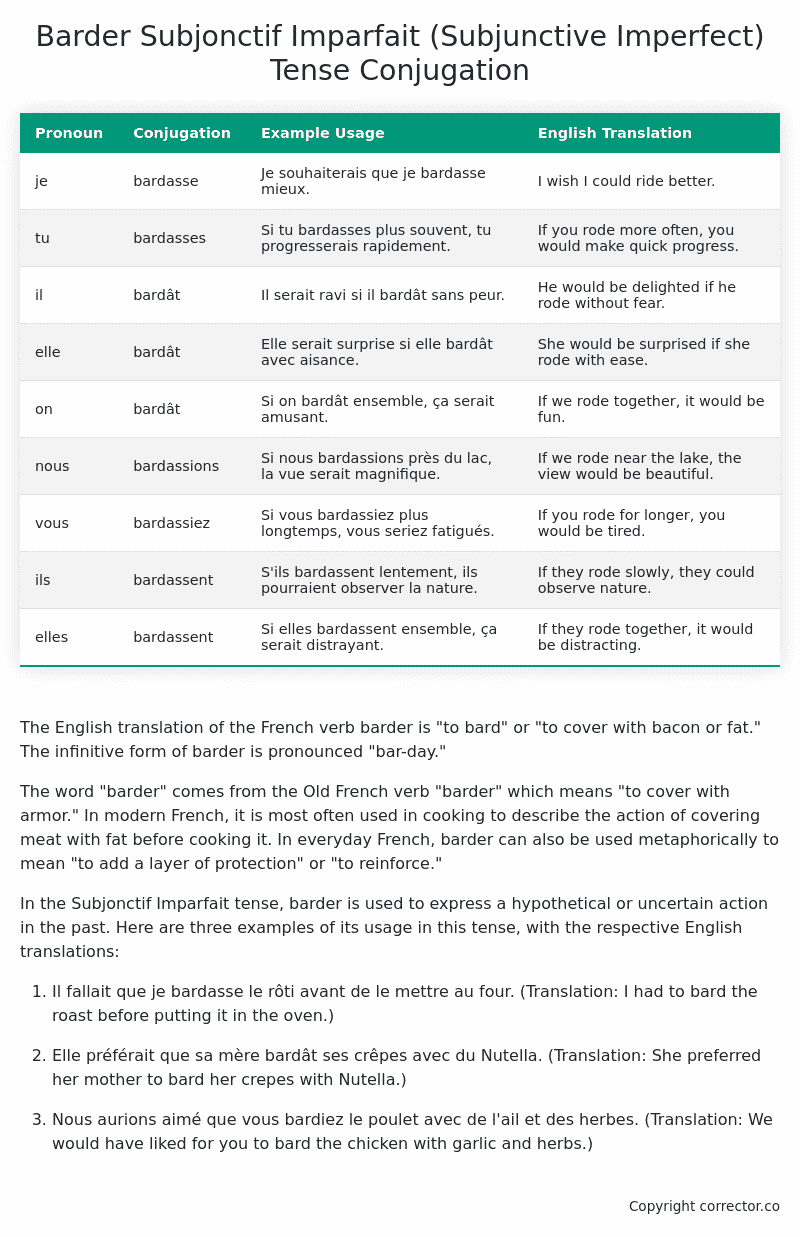Subjonctif Imparfait (Subjunctive Imperfect) Tense Conjugation of the French Verb barder
Introduction to the verb barder
The English translation of the French verb barder is “to bard” or “to cover with bacon or fat.” The infinitive form of barder is pronounced “bar-day.”
The word “barder” comes from the Old French verb “barder” which means “to cover with armor.” In modern French, it is most often used in cooking to describe the action of covering meat with fat before cooking it. In everyday French, barder can also be used metaphorically to mean “to add a layer of protection” or “to reinforce.”
In the Subjonctif Imparfait tense, barder is used to express a hypothetical or uncertain action in the past. Here are three examples of its usage in this tense, with the respective English translations:
-
Il fallait que je bardasse le rôti avant de le mettre au four.
(Translation: I had to bard the roast before putting it in the oven.) -
Elle préférait que sa mère bardât ses crêpes avec du Nutella.
(Translation: She preferred her mother to bard her crepes with Nutella.) -
Nous aurions aimé que vous bardiez le poulet avec de l’ail et des herbes.
(Translation: We would have liked for you to bard the chicken with garlic and herbs.)
Table of the Subjonctif Imparfait (Subjunctive Imperfect) Tense Conjugation of barder
| Pronoun | Conjugation | Example Usage | English Translation |
|---|---|---|---|
| je | bardasse | Je souhaiterais que je bardasse mieux. | I wish I could ride better. |
| tu | bardasses | Si tu bardasses plus souvent, tu progresserais rapidement. | If you rode more often, you would make quick progress. |
| il | bardât | Il serait ravi si il bardât sans peur. | He would be delighted if he rode without fear. |
| elle | bardât | Elle serait surprise si elle bardât avec aisance. | She would be surprised if she rode with ease. |
| on | bardât | Si on bardât ensemble, ça serait amusant. | If we rode together, it would be fun. |
| nous | bardassions | Si nous bardassions près du lac, la vue serait magnifique. | If we rode near the lake, the view would be beautiful. |
| vous | bardassiez | Si vous bardassiez plus longtemps, vous seriez fatigués. | If you rode for longer, you would be tired. |
| ils | bardassent | S’ils bardassent lentement, ils pourraient observer la nature. | If they rode slowly, they could observe nature. |
| elles | bardassent | Si elles bardassent ensemble, ça serait distrayant. | If they rode together, it would be distracting. |
Other Conjugations for Barder.
Le Present (Present Tense) Conjugation of the French Verb barder
Imparfait (Imperfect) Tense Conjugation of the French Verb barder
Passé Simple (Simple Past) Tense Conjugation of the French Verb barder
Passé Composé (Present Perfect) Tense Conjugation of the French Verb barder
Futur Simple (Simple Future) Tense Conjugation of the French Verb barder
Futur Proche (Near Future) Tense Conjugation of the French Verb barder
Plus-que-parfait (Pluperfect) Tense Conjugation of the French Verb barder
Passé Antérieur (Past Anterior) Tense Conjugation of the French Verb barder
Futur Antérieur (Future Anterior) Tense Conjugation of the French Verb barder
Subjonctif Présent (Subjunctive Present) Tense Conjugation of the French Verb barder
Subjonctif Passé (Subjunctive Past) Tense Conjugation of the French Verb barder
Subjonctif Imparfait (Subjunctive Imperfect) Tense Conjugation of the French Verb barder (this article)
Subjonctif Plus-que-parfait (Subjunctive Pluperfect) Tense Conjugation of the French Verb barder
Conditionnel Présent (Conditional Present) Tense Conjugation of the French Verb barder
Conditionnel Passé (Conditional Past) Tense Conjugation of the French Verb barder
L’impératif Présent (Imperative Present) Tense Conjugation of the French Verb barder
L’infinitif Présent (Infinitive Present) Tense Conjugation of the French Verb barder
Struggling with French verbs or the language in general? Why not use our free French Grammar Checker – no registration required!
Get a FREE Download Study Sheet of this Conjugation 🔥
Simply right click the image below, click “save image” and get your free reference for the barder Subjonctif Imparfait tense conjugation!

Barder – About the French Subjonctif Imparfait (Subjunctive Imperfect) Tense
Formation
Common Everyday Usage Patterns
Interactions with Other Tenses
Subjonctif Présent
Indicatif Passé Composé
Conditional
Conditional Perfect
Summary
I hope you enjoyed this article on the verb barder. Still in a learning mood? Check out another TOTALLY random French verb conjugation!


